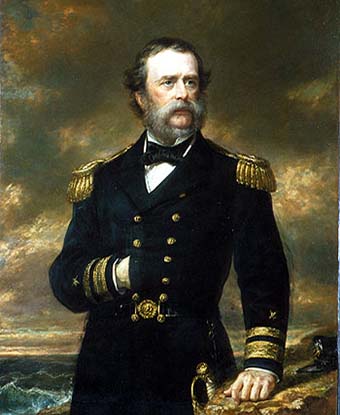Last updated: December 5, 2019
Person
Samuel Francis Du Pont

National Portrait Gallery
Samuel Francis Du Pont, a Union admiral of the Civil War, commanded the Port Royal expedition in 1862, the Union navy’s first major victory over the Confederacy. The following year, his long and distinguished naval career ended with his defeat in Charleston Harbor.
Du Pont was born in New Jersey in 1803 but grew up on the banks of Brandywine Creek in Pennsylvania. His uncle founded DuPont, which began as a gunpowder factory, and today is the famous multinational chemical corporation. His family’s political connections helped him receive an appointment as a midshipman in 1815, beginning a long naval career which included honorable service in the Mexican-American War.
After his Mexican-American War service, Du Pont spent time ashore, modernizing the U.S. Navy and studying the possibilities of steam power. Du Pont was made commandant of the Philadelphia Naval Shipyard in 1860, expecting to retire in the post. However, the outbreak of the Civil War called him again to active duty.
Du Pont helped plan naval operations for the Union at the start of the Civil War. He was then given command of the South Atlantic Blockading Squadron, the largest fleet ever commanded by a naval officer up to that time. On November 7, 1861 his fleet captured Port Royal, South Carolina, providing the Navy with a large natural harbor and perfect staging area for future operations in the area. This success was later overshadowed by his command of an unsuccessful ironclad attack on Fort Sumter on April 7, 1863.
Nine Federal ironclads under the command of Rear Admiral Samuel Francis Du Pont faced an intense crossfire from Confederate-held Forts Sumter and Moultrie. Confederate guns hit the USS Keokuk, piloted by Robert Smalls, ninety times. The vessel sunk off Morris Island the day after the battle. Predicting defeat before the battle even started, Du Pont lacked the will to aggressively lead the campaign, correctly predicting the strength of the forts against his ironclads.
Secretary of the Navy Gideon Welles later relieved Du Pont of his command of the South Atlantic Blockading Squadron, writing “I do not find in this nor in any communication received from you since the 7th of April any proposition for a renewed attack upon Charleston, or suggestions even for active operations against that place...The government is unwilling to relinquish all further efforts upon a place that has been so conspicuous in this rebellion, and which continues to stimulate treason and resistance to the Union and the government, and whose reduction is so essential.”
Du Pont returned home to Delaware and had no further significant role in the war. He died on June 23, 1865 during a trip to Philadelphia.
